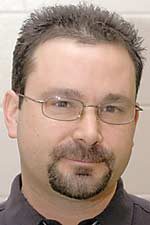‘Messy’ system turns young voters away from polls when most needed

‘Messy’ system turns young voters away from polls when most needed
“Bad officials are elected by good citizens who do not vote.” – George Jean Nathan
Never in the history of the human race have a people been presented with so many trivial choices – at the very time they should be concentrating on significant ones.
I’m not talking about the obvious consumer choices – McDonalds vs. Burger King, Nike vs. Reebok, Play Station vs. X-Box. Even if we decide on Coke instead of Pepsi, we are still obliged to choose which of the current 12,000 versions we want: Caffeine-Free-Low-Carb-Cherry-Vanilla-Ginseng-Viagra Coke anyone?
And then there’s the MTV Awards, the Espys, the online Jay-Z vs. Nelly polls, the opportunities to “have you voice counted” about which Survivor should be voted off the island, who should bed the Bachelor, or become the next Apprentice, or the next bride of Joe Millionaire or the most likeable mommy on “Trading Spouses” – wait, I meant “Wife Swap.”
As Americans, we glory in these choices – it’s the essence of our freedom, isn’t it? And in the age of interactivity we demonstrate it with a vengeance. On the night of the finals of the first “American Idol,” the two largest phone carriers in the United States reported that call volume was more than 230 million calls above normal. 230 million calls. Just to decide which pre-fab nonentity would be pronounced an international fake superstar.
Why then does the United States have by far the lowest voter turnout of any Western society — I mean turnout for votes which actually effect whether we go to war, what rules we will live under, which rights will be upheld and how our money (and our children’s money) will be spent?
Why, furthermore, do young people – those who will be most affected by the political decisions now being made – show the least interest among any group of Americans in politics and voting?
The fact is citizens in the 18-25 year range turn out at a rate of approximately 32 percent in presidential elections. And the rate for that age range amongst those lacking a college education is a pathetic 21 percent.
Nationwide, young adults say the biggest reason they don’t vote is because “they do not care.” This is followed by “voting does not make a difference,” “not informed” and “too busy/not enough time.”
Too busy? Perhaps mastering Madden NFL 2004 and scanning the ‘net for Eminem remixes are big time commitments. Or maybe there are better reasons for youthful apathy.
If you are not in college, you are statistically likely to be working a series of dead-end retail and/or manufacturing jobs, with no property, no kids and no “investment in the system.”
If you are in college you are probably struggling to balance schoolwork with your part-time job(s). You may be unsure about how and where to vote while living away from home.
But most likely, you, as a young person, have grown cynical about politicians, who seem to consist of two types: either mealy-mouthed hypocrites or attack-ad spewing jerks.
It is to you I make my appeal.
First, let’s agree. American politics in the Age of television is a brutal and degrading blood sport. Who could fail to be disgusted by the constant sniping, the dishonest political commercials, the pompous pundits trying to tell us what to think? It’s enough to make us ready to concede to Winston Churchill his famous claim that “Democracy is the worst form of government,” as long as we remember the rest of the sentence, “with the exception of all
others.”
Democracy is messy, and messiness tends to turn off the idealism of young people. Thus they opt out altogether.
Here’s my advice: don’t wait for the system or the politicians in it to become perfect. They won’t. But they will be a little less unbearable if they know more people are keeping an eye on them.
Much is at stake in every election, but there’s never been more on the line for Americans in general and young Americans in particular than on Nov. 2. And young people, especially those in swing states like Missouri, have the opportunity to make the difference.
There are already some encouraging signs: young voter turnout increased almost 60 percent in last year’s New Hampshire Democratic primary. Four times as many 18-to-24 year olds turned out for the 2004 Iowa caucuses than in 2000 caucus, and there were also increases in turnout for the primaries across the country. In a poll taken in October 2003, 39 percent of people aged 17 to 24 were “absolutely certain” they would vote in the 2004 elections, 30 percent higher than its highest point a year before the 2000 elections.
Will students on this campus be part of a historic renewal of interest in politics, civics and citizenship? Will they demand that politicians address their concerns, safeguard their futures and consider their needs? Or will they continue to allow others to make decisions which will affect virtually every aspect of the life they have ahead of them?
Let’s just say there’s a whole lot more at stake in these questions than whether we’ll be afflicted by Ruben Studdard or Clay Aiken.
Your donation will support the student journalists of Missouri Southern State University. Your contribution will allow us to purchase equipment and cover our annual website hosting costs.



























